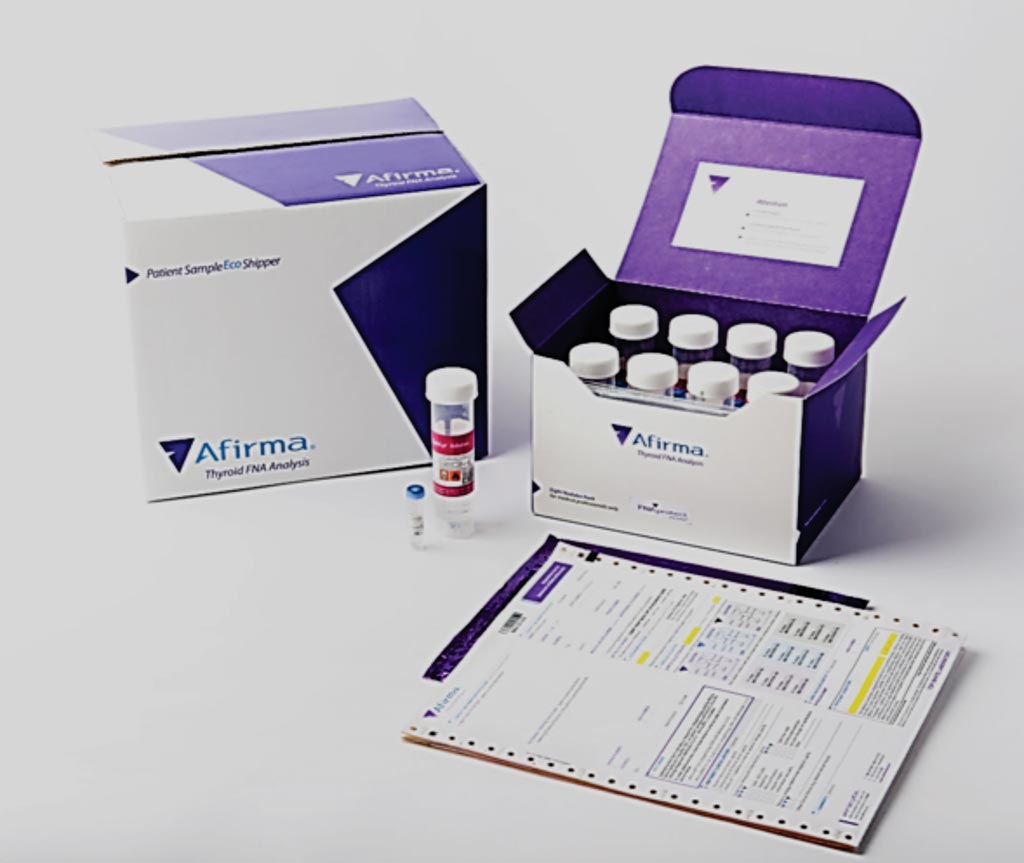Molecular Testing Evaluated for Thyroid Nodules
By LabMedica International staff writers
Posted on 26 Jul 2017
Thyroid nodules are a common clinical concern and increasing use of diagnostic imaging likely explains a large part of the increased incidence of thyroid nodules and the subsequent diagnosis of thyroid cancer that has been observed during the last three decades.Posted on 26 Jul 2017
Prior to molecular assays, most patients with indeterminate cytology were referred for a diagnostic lobectomy or total thyroidectomy, based on other risk factors for cancer or the presence of contralateral nodularity, immediately or after another biopsy demonstrating persistently indeterminate cytology results. However, most of the nodules that fall into an indeterminate category are benign on resection.

Image: The Afirma Gene Expression Classifier kit for thyroid FNA Analysis reduces thyroid cancer surgery treatment costs (Photo courtesy of Veracyte).
Pathologists at the Duke University Medical Center (Durham, NC, USA) performed a retrospective analysis of cytology and all in-house thyroid fine needle aspirations (FNAs) sent for molecular testing from September 2013 to March 2015. Each FNA was performed by palpation or with ultrasound guidance by board-certified radiologists, endocrinologists, surgeons, and cytopathologists. Immediate assessments for adequacy were performed with each biopsy.
The study cohort comprised 115 thyroid nodules from 110 patients, including 86 females (78%) and 24 males (22%). The ages of the patients ranged from 16 to 87 years, with a mean age of 56.5 years at the time of FNA. The scientists’ objective was to report their experience at a tertiary thyroid referral center with the Afirma Gene Expression Classifier in repeat fine-needle aspirations of thyroid nodules with a previous indeterminate cytological result. The surgical pathology results were correlated with the FNA and Afirma GEC findings by matching the biopsied nodule to the surgically resected nodule, which served as the gold standard.
The fine-needle aspiration diagnostic categories for the115 nodules were 100 (87%) Bethesda III, 10 (9%) Bethesda IV, 3 (2%) Bethesda II, 1 (1%) Bethesda V, and 1 (1%) Bethesda I. Afirma results for 52 (45%) of the nodules were benign, 57 (50%) were suspicious and 6 (5%) specimens yielded no result because of low messenger RNA content. Three of the benign nodules (6%) were treated surgically, and all were benign on final surgical pathology. Forty-six (81%) of the suspicious nodules were treated surgically; final surgical pathology revealed 30 (65%) were benign and 16 (35%) malignant, yielding a positive predictive value of 35%.
The authors concluded that 50% of the indeterminate nodules were classified as suspicious by Afirma, with a 35% rate of malignancy in these nodules at surgical resection, in comparison with a historical rate of malignancy at their institution of 11% for Bethesda III nodules and 23% for Bethesda IV. Their experience at a tertiary referral center was that when reserved for use in repeat-indeterminate nodules, the test has similar performance to that published at initial biopsy, thus avoiding the need to collect large numbers of additional passes for Afirma GEC testing at first biopsy, while also keeping the benefit of potentially reducing the number of operations performed for benign nodules. The study was published in the July 2017 issue of the journal Archives of Pathology & Laboratory Medicine.
Related Links:
Duke University Medical Center













